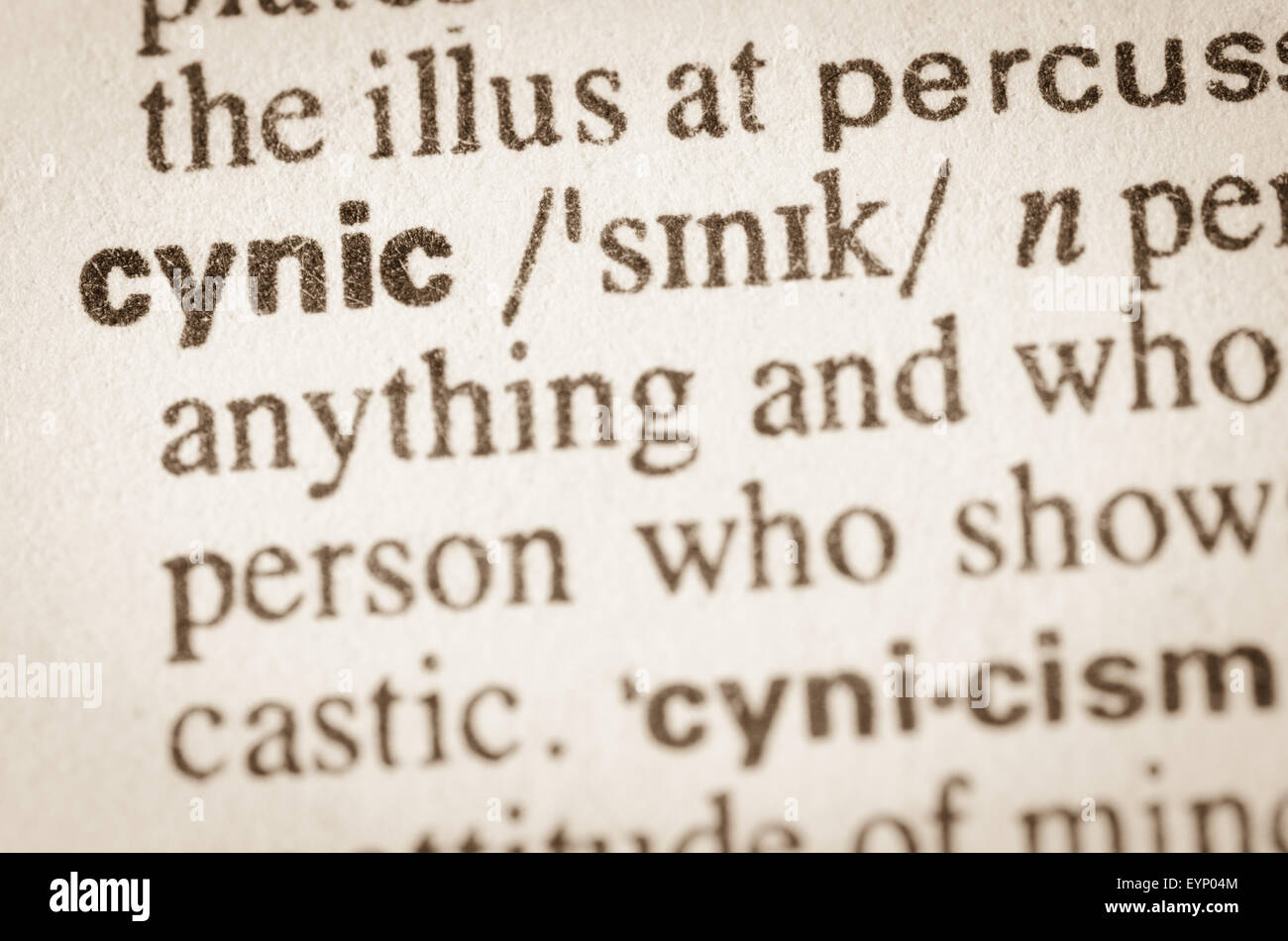Sometimes, you hear a word and just know it describes a certain way of looking at the world, a sort of deeply questioning stance. One of those words, a really interesting one, is "cynical." It paints a picture of someone who views things with a bit of a skeptical eye, always wondering if there's more to the story than what meets the eye. It's not just being doubtful, you know, it's a particular kind of doubt that often comes from a place of not expecting the best from people or situations. This kind of thinking, you see, tends to see the hidden self-interest in nearly everything.
When we talk about the cynical definition, we're really talking about a way of thinking that suggests a deep, deep lack of trust. It’s almost like a person who holds this view has a constant feeling that honesty or good intentions are rarely what they seem. They might look at someone doing something seemingly kind and, in their mind, immediately wonder what that person really wants out of it. This isn't just a fleeting thought; it’s more like a settled belief, a core part of how they make sense of the world around them, you know?
This particular way of seeing things, the cynical definition, often means someone has a belief that people are mostly driven by their own wants and needs, rather than by a genuine desire to help or be truly good. It’s a perspective that, in some respects, questions the very idea of pure motives. If someone is being kind, a person with this outlook might think, "Well, what's their angle? What do they get out of this?" It’s a view that can feel a bit bleak, perhaps, but it's a very real way that some folks experience the world, isn't it?
Table of Contents
- What Does it Mean to Be Cynical?
- How Does the Cynical Definition Appear in Daily Life?
- Is There a Difference Between the Cynical Definition and Misanthropy?
- What Drives This Cynical Definition?
- Recognizing the Cynical Definition in People
- How Can We Understand the Cynical Definition Better?
- Exploring the Origins of a Cynical Definition
- Why Does the Cynical Definition Hold Importance?
What Does it Mean to Be Cynical?
When we talk about someone being cynical, it really points to a feeling of deep, deep distrust. It's more than just a passing doubt; it's a settled way of viewing the world, a sort of constant questioning of what others say or do. This outlook often means a person sees things with a kind of sneering disbelief when it comes to honesty or good intentions. They might hear a promise and, almost immediately, think it's not truly sincere. It's a perspective that tends to assume the worst, you know, rather than hoping for the best. This isn't just about being a little bit doubtful; it's about a deep-seated suspicion of sincerity itself. A cynical person often has a very bleak outlook about others, always imagining that people are guided by their less noble impulses. They might see an act of kindness and, in their mind, just assume there's a hidden agenda, a selfish reason behind it all. It’s a belief that good things won't happen, or that certain things aren't as important as they seem, you know? This kind of thinking can really shape how someone interacts with the world, making them question nearly everything. It’s a bit like they're always looking for the catch, the underlying self-serving reason for any action. So, in essence, being cynical means holding a strong belief that people are mainly interested in themselves and aren't truly honest in their dealings. It's a deep-seated way of thinking that colors how one perceives the world and the people in it, you see.
How Does the Cynical Definition Appear in Daily Life?
The cynical definition shows up in daily life in a lot of ways, you know, often subtly. You might hear someone dismiss a politician's promise with a sort of weary sigh, believing it's just talk and not really meant to lead to actual change. That's a pretty clear example. Or, imagine a friend who hears about a new community project and immediately says, "Oh, they're just doing that for the good press," rather than seeing any genuine desire to help. That's the cynical definition at work, isn't it? It's a way of looking at things where you just don't believe that something good will happen or that something is truly important. Someone with this outlook might be a bit cynical about the benefits of a new plan, always finding reasons why it won't work or why it's not as great as it sounds. They might express a general lack of faith or hope in people, perhaps feeling that others are mainly motivated by ambition, desire, or greed. This isn't always about being openly negative; sometimes, it's just a quiet disbelief, a sort of inner shrug at claims of altruism. It’s a perspective that often means they distrust or even speak ill of the motives of others, always looking for the less flattering reason behind an action. So, you see, it shows up as a constant questioning of sincerity, a kind of default setting to assume self-interest. It’s a mindset that, in a way, prepares them for disappointment, because they don't expect much genuine good from people anyway. This outlook can really shape how someone interprets events and interactions, making them always look for the hidden, less noble side of things, you know?
Is There a Difference Between the Cynical Definition and Misanthropy?
Yes, there's a difference, though they can sometimes feel similar, you know? The cynical definition, as we've talked about, implies having a sort of sneering disbelief in sincerity or integrity. It’s about questioning motives, always looking for the selfish angle. A cynical person might think, "Everyone's out for themselves," but they don't necessarily hate people. Misanthropy, on the other hand, suggests a much deeper, more rooted distrust and dislike of human beings as a whole. It's not just skepticism; it's a genuine aversion, a feeling of not liking people very much at all. Someone who is misanthropic might actively avoid people because they simply don't enjoy human company or believe people are inherently flawed and unpleasant. A cynical person might just be skeptical of a politician's promise, but a misanthrope might dislike all politicians, and frankly, most other people too, just because they are human. So, while both involve a lack of trust, the cynical definition focuses more on the *motives* and *sincerity* of people, seeing them as self-interested. Misanthropy, however, goes a step further, involving a fundamental *dislike* or even *hatred* of humanity itself. It’s a sort of broader, more intense feeling of aversion. You could be cynical about a specific situation, like a new company policy, but not be a misanthrope. A misanthrope, however, would likely be cynical about that policy and also just generally dislike the people who created it, and the people who have to follow it, and, well, everyone else too. It’s a subtle but important distinction, isn't it?
What Drives This Cynical Definition?
What really drives this cynical definition often comes from a place of experience, or perhaps a perceived understanding of how the world truly works, you know? Someone might develop this outlook because they've seen many instances where people acted only in their own interest, despite saying otherwise. It could stem from a belief that people are only interested in themselves and are not sincere in their actions. Maybe they've been let down repeatedly, or observed others being let down, leading them to distrust or disparage the motives of others as a default. This kind of thinking can be shaped by a bleak outlook, always imagining that people are ruled by their worst instincts, like greed or ambition. If someone consistently sees the negative side of human nature, they might start to believe that's all there is. It's a bit like a defense mechanism, perhaps, a way to protect oneself from disappointment by not expecting good things in the first place. This viewpoint often involves a general lack of faith or hope in people, especially when they seem motivated by ambition, desire, or greed. It’s a skeptical stance toward the motives of others, a constant questioning of what’s truly going on behind the scenes. So, a person might become cynical because their experiences have led them to believe that genuine selflessness is rare, or even non-existent. They might feel that most actions, even seemingly good ones, have a hidden, less noble purpose. It’s a perspective that, in a way, tries to prepare them for the perceived reality of human nature, which they see as fundamentally self-serving, you see.
Recognizing the Cynical Definition in People
Recognizing the cynical definition in people often means paying attention to how they talk about others' intentions and actions, you know? Someone who is cynical might often express a belief that people are only interested in themselves and are not sincere. You'll hear them question why someone is doing something, always looking for the selfish angle. For example, if a company announces a new charity initiative, a cynical person might say, "They're just doing that for the tax breaks," or "It's all about public relations, not real giving." They tend to distrust or disparage the motives of others, often making comments that suggest a hidden agenda. They might have a bleak outlook about others, always imagining that people are ruled by their worst instincts. So, they might view a kind gesture as a manipulative tactic, rather than a genuine act of generosity. This kind of person is often skeptical of the motives of others, and this skepticism shows up in their words and general attitude. They might be the one who rolls their eyes when someone talks about hope or idealism. Their experiences, perhaps with men or other relationships, might have led them to this deeply distrustful place. It's like they have a built-in filter that processes all human actions through a lens of self-interest and lack of sincerity. They might say things that are like, "Nobody ever went broke underestimating the intelligence of the American public," as a sort of summary of their view of human nature. This isn't just a fleeting thought; it’s a characteristic way of thinking that shapes their interactions. So, if you notice someone consistently questioning the sincerity of others, or assuming selfish reasons behind seemingly good deeds, that's often a sign of this cynical definition at play, isn't it?
How Can We Understand the Cynical Definition Better?
To really get a grip on the cynical definition, it helps to think about it as an attitude, you know, one that's marked by a general distrust of what drives others. It’s not just being doubtful; it’s a deep-seated belief that people’s actions are almost always driven by their own interests, not by genuine good intentions. A person with this view might have a general lack of faith or hope in people, especially when they see others motivated by things like ambition, desire, or greed. They tend to be skeptical of the motives of others, always looking for the less noble reason behind an action. For example, if someone offers help, a cynical person might immediately wonder what that helper stands to gain. It’s a bit like having a filter that screens out sincerity and integrity, leaving only the perception of self-serving motives. This outlook often means they don't believe that something good will happen, or that something is truly important, because they expect the worst. Their experiences, whatever they may be, have likely reinforced this belief that people are not truly honest. It's a characteristic way of thinking, a sort of ingrained suspicion. Understanding this means recognizing that it’s a deeply held perspective, not just a passing mood. It’s about seeing how someone consistently questions the underlying reasons for actions, always assuming a less noble impulse. So, to understand it better, we need to grasp that it's a worldview where genuine altruism is viewed with extreme doubt, almost as if it doesn't really exist. It’s a deep-seated way of thinking that colors every interaction and observation, you see.
Exploring the Origins of a Cynical Definition
Exploring where a cynical definition comes from often leads us to consider past experiences, you know? It's not something people are usually born with; rather, it tends to develop over time. Someone might become cynical because they've had experiences that showed them how often people act only in their own interest, or how often sincerity seems to be missing. Perhaps they've witnessed a lot of broken promises, or seen situations where people were seemingly kind but had a hidden, selfish motive. This can lead to a rooted distrust and dislike of human nature in general. When a person consistently observes others being driven by ambition, desire, or greed, it can solidify their belief that people are only interested in themselves and are not sincere. It’s a bit like learning from repeated observations that the world isn't as idealistic as it might seem. This can lead to a bleak outlook about others, where they always imagine that people are ruled by their worst instincts. For instance, if someone has been repeatedly let down by those they trusted, they might start to believe that trust itself is a foolish concept. So, the origins of this outlook often lie in a series of events or observations that reinforce the idea that motives are rarely pure. It’s a perspective that gets built up, piece by piece, from perceived evidence of human self-interest and lack of integrity. This isn't to say it's always a conscious choice, but rather a pattern of thinking that emerges from how one has interpreted the world around them, you see.
Why Does the Cynical Definition Hold Importance?
The cynical definition holds importance because it shapes how individuals interact with the world and how society functions, you know? When many people adopt a cynical view, it can affect trust levels in institutions, in leaders, and even in everyday relationships. If you are cynical about something, you often do not believe that it can be successful or that the people involved are honest. This can lead to a general lack of engagement or a reluctance to believe in positive change. For example, a cynical dismissal of a politician's promise to reform something can lead to apathy and a feeling that efforts are pointless. This kind of thinking can also influence personal well-being, as constantly expecting the worst or distrusting others can be emotionally draining. It highlights a particular way of seeing human motivation, one that prioritizes self-interest and a lack of sincerity. Understanding this outlook helps us recognize different perspectives and how they might influence behavior. It shows us that not everyone views the world with optimism or belief in inherent goodness. It’s important because it reflects a significant aspect of human thought, a common way some people make sense of actions and intentions. It’s a way of thinking that, in a way, guards against disappointment by setting low expectations for human behavior. So, knowing what it means helps us to better understand not just individuals, but also the broader currents of public opinion and social interaction, you see. It's a lens through which a portion of the population views nearly everything, and that makes it very important to grasp.


